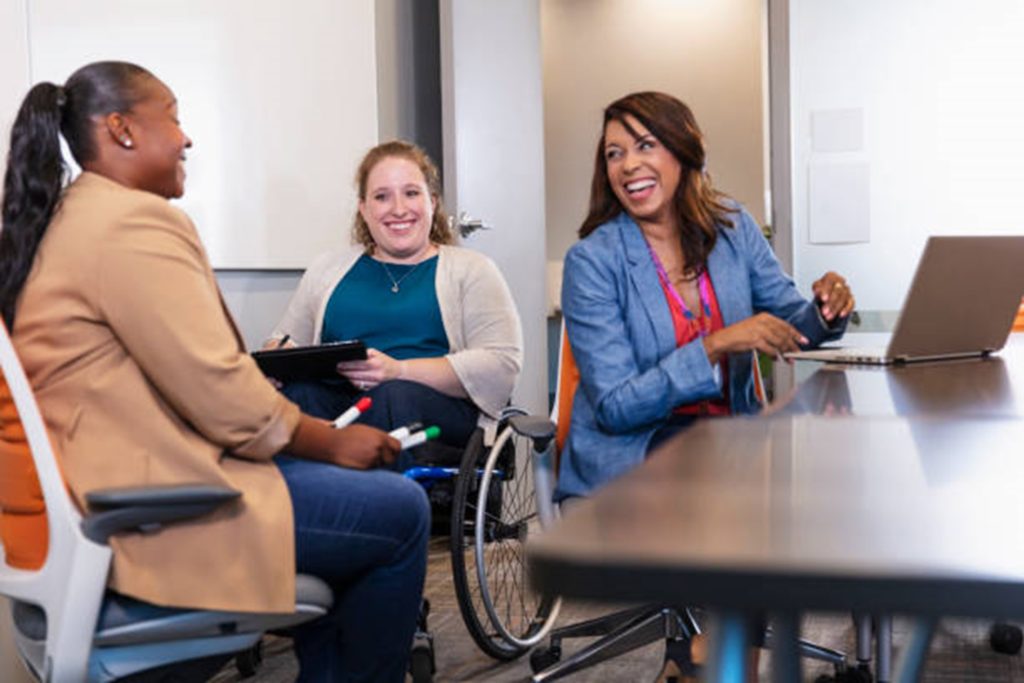by Gretchen Ferber, MD
Women living with spinal cord injury (SCI) are a special population representing the intersection of gender and disability. Spinal cord injury can impact all aspects of one’s life: medical and care needs, education and employment, psychological health, and social life. These impacts can be layered upon identities that bring life meaning: partner, colleague, friend, child, spouse, neighbor, parent, caretaker. Women with SCI experience many changes, particularly to their bodies and their roles in society. Compared to men, women are experiencing proportionally more spinal cord injuries, and indeed, there is a growing population of women living and aging with SCI.

Women with SCI, depending on their age and stage, may have any number of concerns: managing their menstrual cycles, thinking about pregnancy or fertility, practicing safe sex and using contraception, addressing changing sexual function, tackling perimenopause and menopause, and managing increased risk of osteoporosis. While the topic of women’s health with SCI is broad (women are complex!), we will focus on two important aspects: Sexual Function and Preventative Health.
Sexual Function
After spinal cord injury, depending on the level and severity of the injury, women can experience a range of changes: physical and psychological arousal, sensations during sexual activity, areas of arousal, ability to orgasm, and vaginal lubrication. New concerns arise: Will bladder and bowel care interrupt sex? How will I position? What feels good? What if I get autonomic dysreflexia (AD) during sex? Your interdisciplinary spinal cord injury team can address these concerns and find new ways to have a fulfilling sex life. We discuss an expansive view of sexuality after SCI, which means that the expression of sexuality may be different, and sexual needs can be met in new ways. Your SCI physician can describe the physiology of sexual function after SCI, individualized to you. Together with your rehabilitation nurse, they can discuss tips for bowel and bladder management before and after sex, how to keep your skin safe, and how to recognize and treat AD. Your therapists, often occupational therapists, can talk through the practicalities of sex, including positioning and using assistive devices (i.e., sex toys). Your rehab psychologist can address changing identities, self-image, and developing positive coping skills. Women with SCI are having sex at rates similar to before their injuries, indicating the importance of sexual function for women with SCI.
Preventative Health
Throughout life, women with SCI require preventive medicine to maintain health, including preventing or identifying cervical and breast cancer in its earliest stages through regular screening. An important member of your interdisciplinary team is your women’s health physicians: your obstetrician/gynecologist and primary care physician. Research has demonstrated that women with disabilities are less likely to receive pelvic exams compared to their counterparts without disabilities,

highlighting inequity in the care of women with SCI and challenges related to obtaining preventative care. The US Preventative Services Task Force (USPSTF) recommends cervical cancer screening with cervical cytology (Pap smear) every three years for women aged 21 to 29. For women aged 30 to 65, screening is recommended every three years with cytology alone, every five years with human papillomavirus (HPV) testing alone, or every five years with cytology combined with HPV testing.
The American College of Obstetricians and Gynecologists (ACOG) recommends screening for breast cancer with a mammogram for women starting at age 40, no later than age 50, and continuing at least through age 75 with a mammogram every 1-2 years. With these recommendations in mind, entry into accessible spaces and exam rooms remains a significant challenge. The Americans with Disabilities Act (ADA) and Section 504 of the Rehabilitation Act require people with disabilities to have “full and equal access to health care services and facilities” with reasonable modifications to make care available. Fully accessible clinics will have an overhead lift and slide boards available for transfers, gynecological exam tables that allow women with SCI to have a pelvic exam with padded, adjustable stirrups to accommodate contractures and other positioning needs, and mammography machines that enable access via wheelchair. Knowing that many clinic spaces are not accessible, call your doctor’s office ahead of time, identify the transfer needs you have, and ask what equipment and personnel will be on hand to assist you. Use the tools and knowledge of your SCI physician to contact your doctor’s office and advocate for your preventative health care.
Helpful Links
https://www.myshepherdconnection.org/sci/women
https://msktc.org/sci/factsheets/sexuality-sexual-functioning-after-sci
https://craighospital.org/resources/sexual-function-for-women-after-spinal-cord-injury
